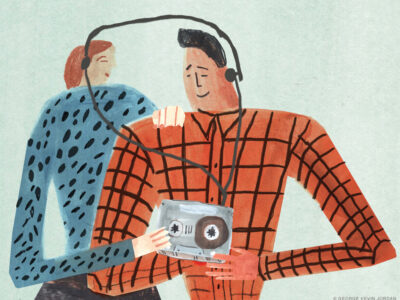
What cases like Terry Schiavo’s can teach us.
By Paul Root Wolpe and Arthur Caplan
Bioethics often comes to the public’s attention when the media discovers, and helps create, high-profile cases. No case has been more controversial and engendered more public debate than the tragic battle over the death of Ms. Theresa Schiavo. Ms. Schiavo was in a persistent vegetative state for 15 years following a heart attack in her home at the age of 26. The struggle between her husband and her parents and siblings about the desirability of withdrawing artificial nutrition and hydration led to over 30 court actions, pointed comments from the Vatican, Florida’s “Terri’s Law,” and the unprecedented involvement of the President, the leaders of Congress, and the United States Supreme Court.
The impact this case had on all Americans, on health-care professionals, and among those interested in bioethics is the reason the Center for Bioethics at Penn celebrated its 10th anniversary on April 30 and May 1 with a conference entitled, “The Legacy of Terri Schiavo: Why is it so Hard to Die in America?” Discussants included Michael Schiavo, Terri’s husband; Judge George Greer of Florida, who decided the case; Jay Wolfson, the court-appointed guardian for Terri; Father Kevin O’Rourke, a noted Catholic theologian and bioethicist; NBC health and science correspondent Robert Bazell; and many other legal, religious, clinical, and bioethics experts.
So, why is it so hard to die in America? In part, because dying itself has changed. Persistent vegetative state, extended coma, minimally conscious states—these are conditions that simply did not exist for most of human history; recent medical technology makes them possible. Dying is hard simply because more and more of us survive severe trauma, repeated cardiac arrests, or traumatic head injury but are left so impaired that we cannot make our wishes or thoughts known. And dying is hard because the traditional family unit has changed, creating more complex decision-making environments involving people who have remarried, live together but remain unmarried, or live so long that frail older people are making health-care decisions for very frail and even older people.
Also, in part, it is because America is deeply divided about the core values that ought to govern decisions about medical care. On one hand, we have a tradition of leaving personal decisions to families and individuals. On the other hand, we have a strong tradition of moralizing about what those decisions should be. America struggles with its two great historical legacies: the liberal individualism that was the hallmark of our Founding Fathers and the religious conservatism that was passed down through the Puritans, through the Great Awakening, to today’s modern evangelical revival.
When those facts and strains collide, as in the Schiavo case, America seems riven. The voices one hears most often are the voices of the extremes, and the pragmatic middle gets lost.
The most startling impression to emerge from the Center’s conference was that the people who were painted by one side or the other as extremists—Michael Schiavo, Judge Greer, Father O’Rourke—come across as thoughtful advocates, see end-of-life care decisions as complicated and fraught with moral difficulty, and deserve none of the venom heaped on them by their opponents.
Julia Quinlan, the mother of Karen Anne Quinlan, spoke movingly of her long struggle to gain the legal right to control her daughter’s care in the landmark case that established a person’s right to refuse life-supporting medical care. Michael Schiavo recounted his 15-year ordeal seeking the best care for his wife, during which he became an emergency medical technician and a nurse in order to better help her, and the painful decision he made after being told by Terri’s physicians that her status would never improve. Calmly, but with obvious pain, he described the websites, protests, and letters and emails that portray him as a wife-abuser, a money-grubber, a philanderer, and a murderer. Dr. David Casarett described the struggles of the families of the geriatric patients he cares for as they try to make difficult decisions about the care of those they love.
Everyone got in his or her shots at the media coverage. The willingness of “experts” to come forward and pronounce on Terri Schiavo’s medical condition, or even offer to “cure” her, and the indulgence of television in particular to give them airtime drew especially critical comment. Bob Bazell of NBC noted that there are all manner of media, and if one finds the “journalism” of the cable channels too overwrought, there are many other outlets available that covered cases like Schiavo with much care and balance.
So what can be done to make dying less burdensome in America for those who cannot make their wishes and feelings about end-of-life care known? A few important points emerged from the presentations and discussions. Hospice care needs to be readily available to all Americans. Physicians need to continue to struggle to improve palliative care and to communicate honest and accurate information to families and loved ones about those who are terminally ill or severely neurologically compromised. Every one of us must discuss our wishes and our choice of a spokesperson with those closest to us, and these wishes must be put in writing in the form of an advance directive or durable medical power of attorney. Our written document needs to be updated every few years to reconfirm our choices.
There are many lessons to be learned from the Schiavo case. No one could have left what was an emotional, disturbing, and illuminating two-day conference without feeling that the most important lesson is that each of us needs to take action so that there are no future cases like that of Terri Schiavo.
Dr. Paul Root Wolpe C’79 is a professor of psychiatry who also holds appointments in the departments of medical ethics and sociology, and is a senior fellow at Penn’s Center for Bioethics. Dr. Arthur L. Caplan is the Emmanuel & Robert Hart Professor of Bioethics, chair of the Department of Medical Ethics, and director of the Center for Bioethics.




